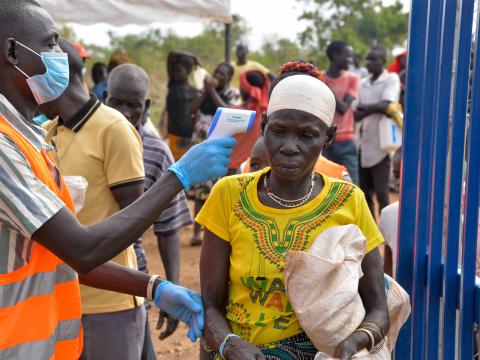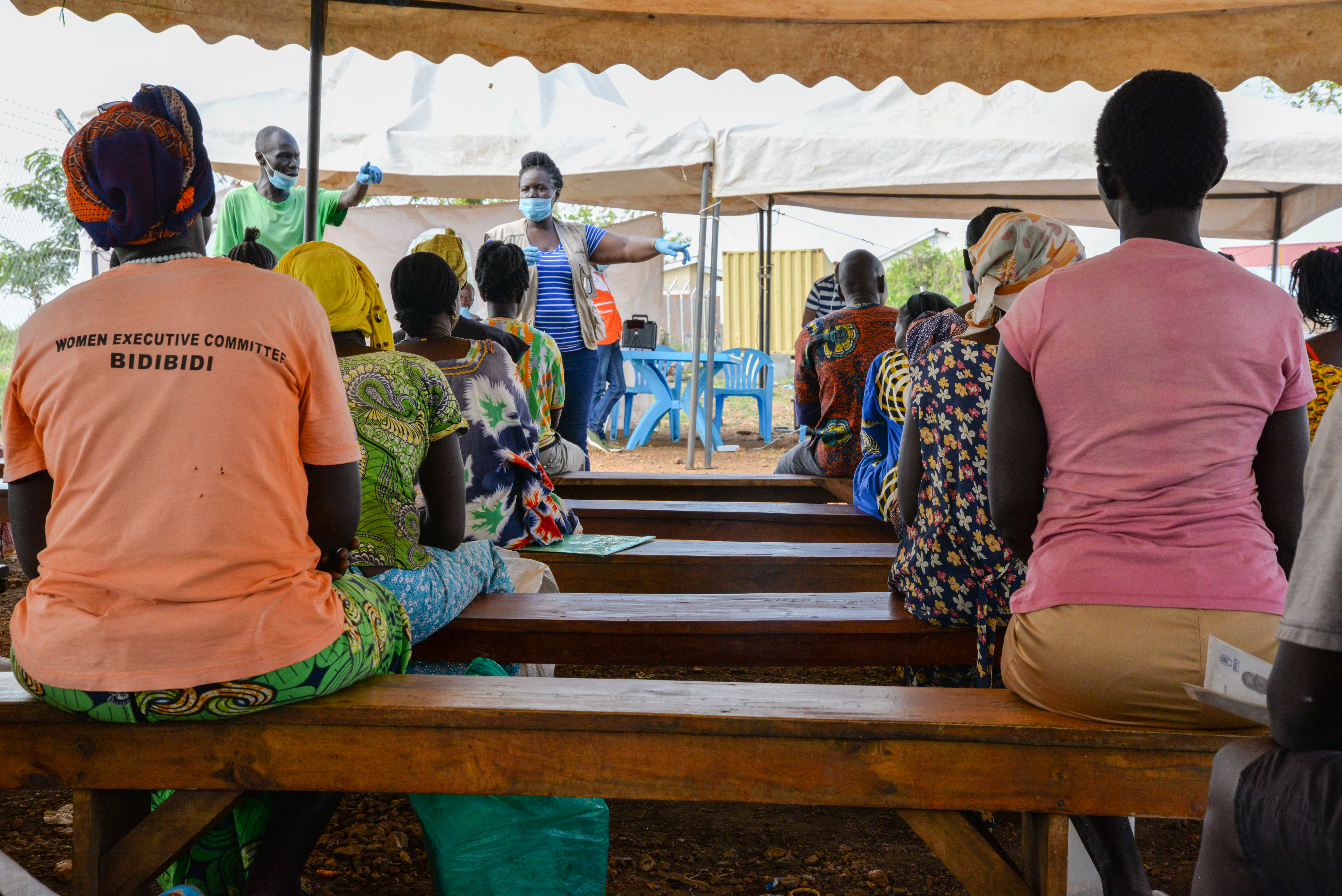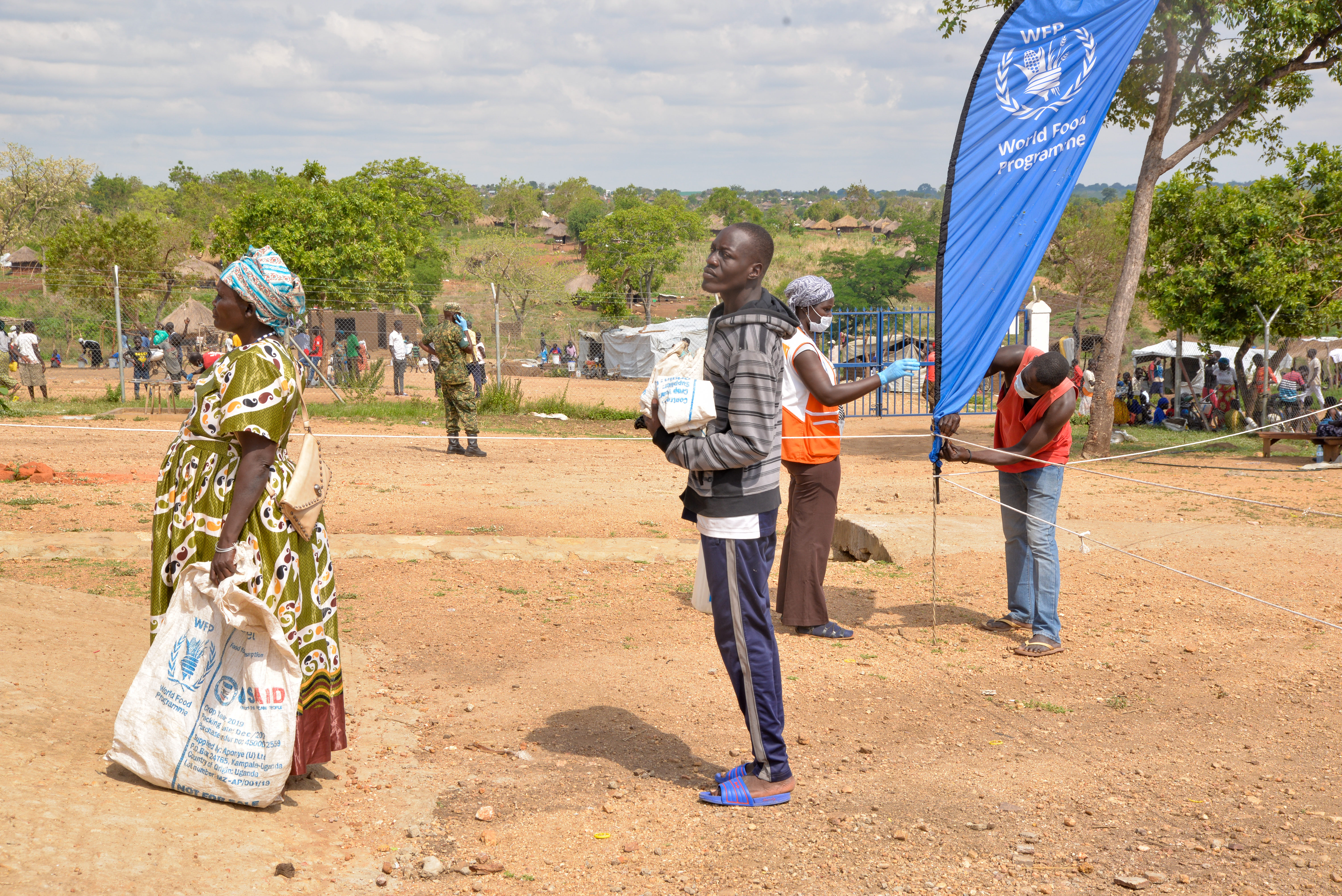COVID-19: Food distribution in Bidibidi settlement continues

With new measures and guidelines in place, World Vision and World Food Programme continue food distribution
By: Derrick Kyatuka, Aggrey Nyondwa Kikobera - Communication Officials, World Vision Uganda
At about 10am on a Friday morning, the sun is already high over the hinterland of Bidi Bidi Refugee Settlement in northwestern Uganda. The people, a lot of them refugees from South Sudan, go about their seemingly daily mundane routines; women with white nylon sacks, jerry cans and buckets make their way to the Food Distribution Point (FDP).
These, however, are noticeably bewildered by the unusual atmosphere, personnel and arrangement at the distribution point. The turn up is low. There is a new briefing tent just outside the gate, the staff and volunteers are all in gloves and masks, and then there are two unusual security officers at the entrance holding temperature guns. It is a whole new setting.
On the inside, through the diamond cage, refugees can see how decongested the verification table is, and how isolated every point is from the other. There is a handwashing facility at each point in addition to one at the main entrance.
A World Vision staff asks the beneficiaries to take their seats under the tent and emphasises that they sit two on a bench that would usually accommodate five of them.
“We have changed our sitting arrangement, and we have new guidelines following the outbreak of COVID-19.” Stella Lunyoro, the field coordinator at Yoyo Food Distribution Point in zone three, Bidi Bidi settlement, starts the briefing.
“We all need to keep safe from this deadly virus by adhering to the new guidelines by Ministry of Health. You will sit two on a bench to maintain the advised distance of two to four metres, and from today, we will call in only five people at a time to go into the halls to collect food.”
There is a murmuring through the beneficiaries for a few seconds.
“As you enter to pick your food, listen carefully to the people who will be guiding you and follow the new rules they give you,” she adds.
After the briefing, the beneficiaries, in groups of five, march to the handwashing facilities provided, and after washing their hands for about 20 seconds each, as briefed, they line up at the entrance with a two-meter distance between them. The two local security guards manning the entrance ensure this.
A World Vision or World Food Programme volunteer checks everyone’s temperature. Anyone with an elevated temperature is ushered into a separate tent and monitored for some time.
The handwashing facilities are everywhere! At the verification table, at each of the hall's entrances, one at the exit of the hall and the other at the Food Distribution Point exit desk.

Why it is Important for World Vision to continue to feed the children
As such a pandemic continues to bite, some of the world’s most vulnerable children will be placed in unprecedented risk and need. Food is one key basic need that children cannot live without.
According to World Vision’s food assistance officer, Annitah Atwiine, the organisation, working with World Food Programme, had to find ways of feeding children and families with strict adherence to the set guidelines.
“We have continued distributing food in the midst of the COVID-19 crisis because food is a necessity. To halt it (food distribution), would mean children missing out on the nutritious food meant for them,” Annitah says.
Protecting staff and beneficiaries
Annitah adds: “Unlike in the previous phases of distribution, we are now emphasising preventive measures in our work since everyone is a potential victim. On average, we have been serving between 800 to 900 households daily, but we have now decongested the FDP and we can only serve half the number.”
This, however, means an increase in the number of distribution days from the usual 12 to 18.
In addition to the handwashing facilities, staff have been provided with personal protective equipment and enough hand sanitizers. Staff and beneficiaries have been urged to keep a safe distance while engaging each other.

Samson Lubali, a refugee from South Sudan was among the hundreds that were curious about seeing the new changes at the Food Distribution Point.
“My body temperature was checked, and I noticed some people have started wearing face masks and gloves. We never washed our hands this many times at the FDP like today,” said Samson.
“We are now aware about the virus. A few people in my community have already put out these facilities to wash hands every time in their households. It is important for all of us to continuously wash our hands with water and soap to stop the spread of COVID-19.”
